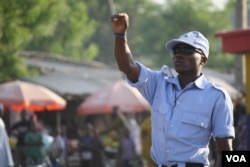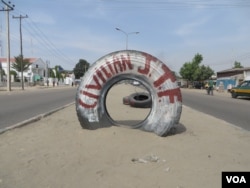MAIDUGURI, NIGERIA —
The Nigerian Army, Air Force and police have been working together as a “Joint Task Force” to fight Islamist militant sect Boko Haram for several years. However, civilian vigilante groups, known collectively as “The Civilian JTF,” say the military alone cannot defeat Boko Haram. In the wake of a massive attack that hit military bases on December 2 in northeast Nigeria, civilians are playing an increasing role in fighting the sect, even at their own peril.
Vigilante groups are not generally considered a danger to society in northern Nigeria. Often, they are considered heroes. A local "Civilian JTF" leader in Borno State, Aba Abji Kall, said that the groups were formed after years of suffering at the hands of Boko Haram militants and years of unsuccessful government attempts to stop the violence.
“Our state has been paralyzed, economic, financially. We lost humans, a lot of our brothers and sisters,” said Kall.
By fighting back, the Civilian JTF has also made themselves Boko Haram’s enemies.
At a hospital in Maiduguri, the original home of the insurgency, a Civilian JTF member named Sani says his group recently attacked a Boko Haram hideout on an island by boat. He says he saw seven men killed, while others report as many as 36 deaths in the firefight.
Borno State Justice Commissioner Kaka Shehu Lawan said that Civilian JTF members are not just in danger when they initiate an attack.
“The Boko Haram insurgents felt the Civilian JTF are their enemy because they arrested hundreds of their members and handed them over to security forces. So as a vengeance, they engage in activities of killing these youth,” said Lawan.
In private, some vigilantes say when the military swept into the region after emergency rule was declared in May, they felt they had to join civilian security groups so soldiers would not mistake them for Boko Haram.
For some, the Nigerian military can be just as feared as the terrorist group they are fighting.
Rights organizations have accused Nigerian security forces of shooting hundreds of suspects and holding many more without charges in dangerous and inhumane conditions.
Already on the government’s side, some members of the Civilian JTF are now more formally joining forces with the military and police. Nigerian security forces in Borno State have already trained nearly 1,800 young men and two women.
Officials say they hope to put 25,000 more people through the three-week program that ends with a ceremony, a pale blue uniform, and a stipend of about $100 a month.
Some Maiduguri residents say if Nigeria wins the fight against Boko Haram, the government should be prepared to continue to support the Civilian JTF or they will have another militant group to contend with.
Shehu Aba, a resident and former soldier, points out that while helpful today, if the government is not careful the Civilian JTF may well turn out to be a double-edged sword.
“They may turn to other things. Because whoever you train… [If] you do not take good care of him, later it is going to be a problem,” said Aba.
Despite all the official and unofficial security, the situation in northeast Nigeria remains dire. The coordinated attacks on December 2 against the Air Force and other military targets in Maiduguri shows the city’s continued vulnerability, even after six months of relative peace under a state of emergency.
The assailants also destroyed a police station, an Army base, and bombed out dozens of vehicles and oil trucks.
However, Army Spokesperson Colonel Muhammed Dole claims that in the past six months, local cooperation has helped the military identify Boko Haram members and thwart other attacks.
“Civilians are now in total cooperation with us. They give us credible information with which we plan our operations. We move along with them. Anywhere they see the movement of these insurgents, they inform us,” said Dole.
After the Air Force attack, the city of Maiduguri was locked down with a 24-hour curfew, relaxed only during daylight hours in the following days. Locals say they fear the return of near-daily Boko Haram violence and threats from extremists. The Civilian JTF remain on the streets, more often armed with sticks, machetes or the occasional bow and arrow, than in the days before.
While some worry that civilian security groups roaming the streets, armed or unarmed, could lead to further chaos, the military says that in the fight against Boko Haram, they need all the help they can get.
Anne Look contributed to this report.
Vigilante groups are not generally considered a danger to society in northern Nigeria. Often, they are considered heroes. A local "Civilian JTF" leader in Borno State, Aba Abji Kall, said that the groups were formed after years of suffering at the hands of Boko Haram militants and years of unsuccessful government attempts to stop the violence.
“Our state has been paralyzed, economic, financially. We lost humans, a lot of our brothers and sisters,” said Kall.
By fighting back, the Civilian JTF has also made themselves Boko Haram’s enemies.
At a hospital in Maiduguri, the original home of the insurgency, a Civilian JTF member named Sani says his group recently attacked a Boko Haram hideout on an island by boat. He says he saw seven men killed, while others report as many as 36 deaths in the firefight.
Borno State Justice Commissioner Kaka Shehu Lawan said that Civilian JTF members are not just in danger when they initiate an attack.
“The Boko Haram insurgents felt the Civilian JTF are their enemy because they arrested hundreds of their members and handed them over to security forces. So as a vengeance, they engage in activities of killing these youth,” said Lawan.
In private, some vigilantes say when the military swept into the region after emergency rule was declared in May, they felt they had to join civilian security groups so soldiers would not mistake them for Boko Haram.
For some, the Nigerian military can be just as feared as the terrorist group they are fighting.
Rights organizations have accused Nigerian security forces of shooting hundreds of suspects and holding many more without charges in dangerous and inhumane conditions.
Already on the government’s side, some members of the Civilian JTF are now more formally joining forces with the military and police. Nigerian security forces in Borno State have already trained nearly 1,800 young men and two women.
Officials say they hope to put 25,000 more people through the three-week program that ends with a ceremony, a pale blue uniform, and a stipend of about $100 a month.
Some Maiduguri residents say if Nigeria wins the fight against Boko Haram, the government should be prepared to continue to support the Civilian JTF or they will have another militant group to contend with.
Shehu Aba, a resident and former soldier, points out that while helpful today, if the government is not careful the Civilian JTF may well turn out to be a double-edged sword.
“They may turn to other things. Because whoever you train… [If] you do not take good care of him, later it is going to be a problem,” said Aba.
Despite all the official and unofficial security, the situation in northeast Nigeria remains dire. The coordinated attacks on December 2 against the Air Force and other military targets in Maiduguri shows the city’s continued vulnerability, even after six months of relative peace under a state of emergency.
The assailants also destroyed a police station, an Army base, and bombed out dozens of vehicles and oil trucks.
However, Army Spokesperson Colonel Muhammed Dole claims that in the past six months, local cooperation has helped the military identify Boko Haram members and thwart other attacks.
“Civilians are now in total cooperation with us. They give us credible information with which we plan our operations. We move along with them. Anywhere they see the movement of these insurgents, they inform us,” said Dole.
After the Air Force attack, the city of Maiduguri was locked down with a 24-hour curfew, relaxed only during daylight hours in the following days. Locals say they fear the return of near-daily Boko Haram violence and threats from extremists. The Civilian JTF remain on the streets, more often armed with sticks, machetes or the occasional bow and arrow, than in the days before.
While some worry that civilian security groups roaming the streets, armed or unarmed, could lead to further chaos, the military says that in the fight against Boko Haram, they need all the help they can get.
Anne Look contributed to this report.












